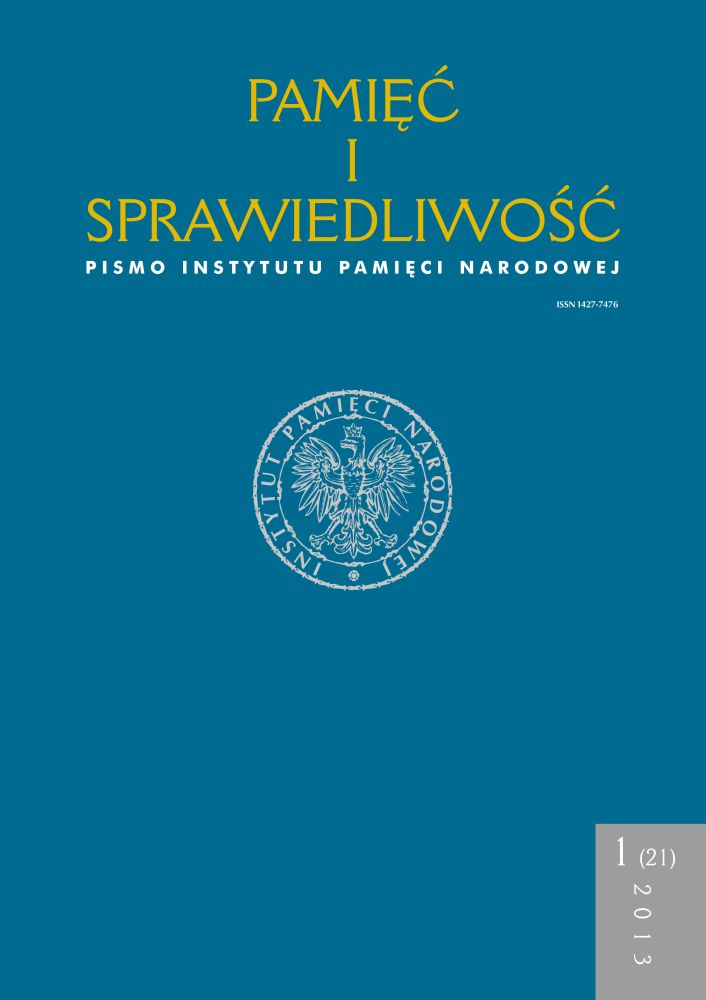Zrozumieć totalitaryzm
Pamięć i Sprawiedliwość, Tom 21 Nr 1 (2013), strony: 11-21
Data publikacji: 2013-06-30
Abstrakt
Bibliografia
J. Tischner, Filozofia współczesna, Kraków 1989, J. Tischner, Filozofia dramatu, Paryż 1990, J. Tischner, Myślenie według wartości, Kraków 1993, J. Tischner, Spór o istnienie człowieka, Kraków 1998, J. Tischner, Polski młyn, Kraków 1991, Instytut Wydawniczy Księży Misjonarzy Nasza Przeszłość, J. Tischner, Etyka solidarności oraz Homo sovieticus, Kraków 1992, Hannah Arendt, Korzenie totalitaryzmu, Warszawa 1993, Carl J. Friedrich, Zbigniew K. Brzeziński Totalitarian Dictatorship and Autocracy, New York 1956, Leonard Shapiro, Totalitaryzm, Warszawa 1987, Czas totalitaryzmu. Stalinizm, faszyzm, nazizm i inne pokrewne systemy w XX wieku, red. E.C. Król, J. Szymoniczek, Warszawa 2011, Jacob L. Talmon, The Origins of Totalitarian Democracy, Boston 1952, Ernst Nolte, Der Faschismus in seiner Epoce, München 1971, Alain Besançon, Przekleństwo wieku: O komunizmie, narodowym socjalizmie i jedności Zagłady, Warszawa 2000, Alain Besançon, Anatomia widma, Warszawa 1991, wyd. Res Publica M. Foucault, Filozofia, historia, polityka, Warszawa–Wrocław 2000, A. Zinowiew, Homo sovieticus, Londyn 1984, Z. Stawrowski, Homo Sowieticus – dezaktywacja, „Rzeczy Wspólne” 2012, nr 9, s. 157–194, J. Tischner, Kłamstwo polityczne. Z badań nad istotą stalinizmu [w:] J. Tischner, Polski młyn, Kraków 1991, Instytut Wydawniczy Księży Misjonarzy Nasza Przeszłość J. Tischner Labirynt schorowanej woli [w:] J. Tischner, Polski młyn, Kraków 1991, Instytut Wydawniczy Księży Misjonarzy Nasza Przeszłość, s. 233–244, J. Tischner, Judaizm i chrześcijaństwo wobec totalitaryzmu dwudziestego wieku [w:] J. Tischner, Polski młyn, Kraków 1991, Instytut Wydawniczy Księży Misjonarzy Nasza Przeszłość, s. 145–164, P. Codogni, Rok 1956, Warszawa 2006, W. Bonowicz, Tischner, Kraków 2001, Totalitaryzm a zachodnia tradycja, red. M. Kuniński, Kraków 2006, E. Fromm, Ucieczka od wolności, Warszawa 1970, J. Tischner, Nieszczęsny dar wolności, Kraków 1993, Zbigniew Stawrowski O pewnej fundamentalnej iluzji. Polemiczny komentarz do myślenia politycznego Józefa Tischnera zob. Bądź wolność Twoja. Józefa Tischnera refleksja nad życiem publicznym, red. J. Jagiełło, W. Zuziak, Kraków 2005, s. 65-81,
 Język Polski
Język Polski
 English
English
 Deutsch
Deutsch
 Français (France)
Français (France)
 Italiano
Italiano
 Русский
Русский


 PDF
PDF
